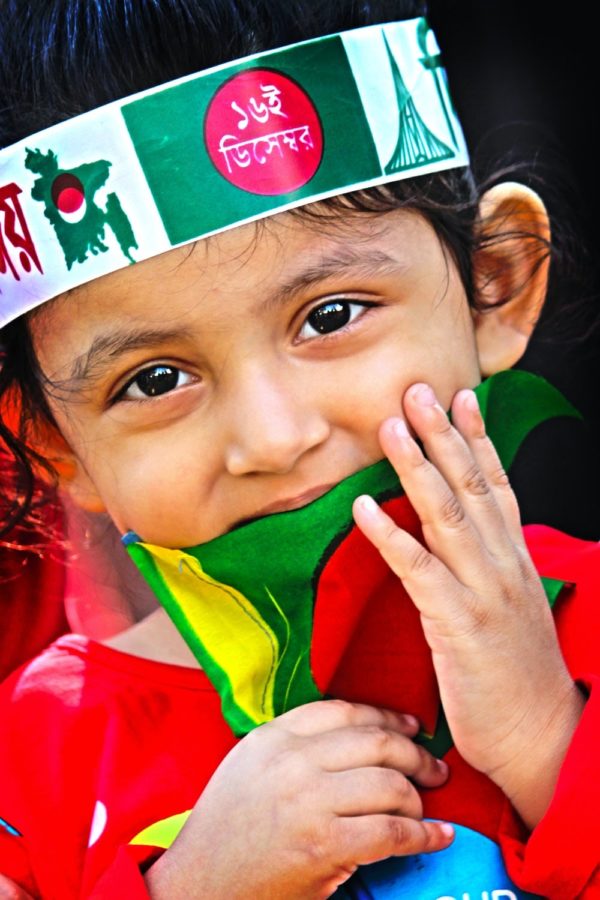Bangladesh: A Country Still Divided By Religion
A reminder of the past — on December 16th, 1971, it finally became independent.
While this boy may be celebrating December 16th, 2021 as the day of independence for Bangladesh, it means more for many Hindus. For Hindus, the day is a reminder that while the country may be free, religion still divides many and has plagued the minds of many to the point of violence.
Digital media has skyrocketed over the past few years. WhatsApp, Facebook, Instagram, and Snapchat are just a few in a long list of social media sites that many view daily and sometimes become victims to false information through viewing them. Content and creators on WhatsApp and Facebook can be credited with spreading the false information that took dozens of lives and ruined many more in Bangladesh. A fake video depicting a police officer carrying the Islamic holy book, with a voice-over claiming it had been rescued from under the feet of a Hindu idol can be accredited for the terror that currently lives in the hearts of many in Bangladesh. The backlash to this video is responsible for claiming the lives of many Hindus, the destruction of their home and many of their livelihoods at the hands of their Muslim neighbors in the months of October and November 2021.
While this video may have been responsible for the tragedies that occurred from October to November 2021, the tragedy began long before. Bangladesh celebrated fifty years of independence on December 16th, 2021, something that did not come without the cost of thousands of lives and discrimination. On August 15th, 1947, India gained its independence, ending 150 years of influence by the British in the Indian subcontinent. One day prior, on August 14th, the British had declared Pakistan independent, resulting in the birth of three new countries: West Pakistan, East Pakistan, and India in the middle.
East Pakistan did not only have a geographical boundary separating it from West Pakistan. There were differences in religion, language ,and culture. East Pakistan fought for years — until on December 16th, 1971, it finally became independent under the name of Bangladesh. However, the religions that the British had used to divide the Indian subcontinent would forever affect its people. Hindus make up about 10% of the population in Bangladesh, leading to the constant terror that they have suffered for more than 100 years. But as Mahz Ahmed ’23 said, “ it is also not surprising that this cycle of violence among Hindus and Muslims in South Asia continues because of a Partition line once drawn by the British, a line that disregarded families and communal roots tied to certain regions.” The 10% may seem small, but that number equates to 13 million people who have been fearing for their lives for centuries.
Bangladesh is a country where a single video is enough to incite religious violence. On October 15th, 2021, that single video depicting a Quran, Islamic holy book, at the feet of a Hindu Goddess was enough to cause a crowd of 10,000 to gather outside a mosque in the country’s capital city, Dhaka. The crowd shouted, “Hang the culprits” and released their anger upon any passerby that they evaluated as a Hindu. While the country’s capital was in turmoil, across much of the country rioters beat Hindus and destroyed their property. Hundreds were left wounded, and dozens dead.
This video not only claimed the lives and property of Hindus, but it instilled a fear of leaving their homes during the most celebrated time of the year for Hindus. Durga Puja, a five day celebration for the Goddess Durga, is deemed the biggest celebration for Bengali Hindus.
What is more disheartening is that this photo was set up and faked, yet managed to start a flood of attacks including the torching of dozens of homes, towns, and vandalism of temples and statues all throughout the country. Ms. Diane Steiker, a history teacher at Bronx Science, expressed the sentiment from many when she said, “Attacking religious groups because of their beliefs is the beginning of what could become a potential genocide. These incidents should never be taken lightly, and the global community, although powerless to intercede in a nation’s sovereignty, should hold the governments of Bangladesh responsible.”
A Bangladeshi human rights group, Ain o Salish Kendra, has reported at least 3,679 attacks on the Hindu community since January 2013, including vandalism, arson, and targeted violence. The government has repeatedly failed to investigate or prosecute these injustices. The same applies to the attacks from October 15th, 2021, where many rioters were let free, despite the knowledge of their identities. Bangladesh may have been a result of the British’s view on religion in the Indian subcontinent, but it has yet to rid itself of the opinions and biases held more than 50 years ago.
“Attacking religious groups because of their beliefs is the beginning of what could become a potential genocide. These incidents should never be taken lightly, and the global community, although powerless to intercede in a nation’s sovereignty, should hold the governments of Bangladesh responsible,” said Ms. Diane Steiker, a history teacher at Bronx Science.
Niha Roy is a Managing/Advisory Editor and a Staff Reporter for ‘The Science Survey.' She enjoys writing articles about issues and groups of people whom...

